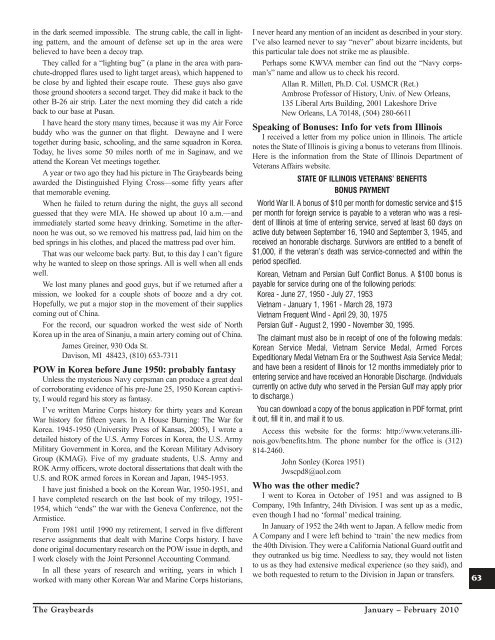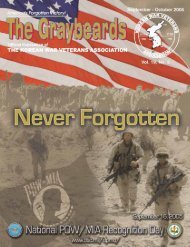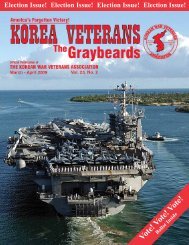Jan/Feb 2010 - Korean War Veterans Association
Jan/Feb 2010 - Korean War Veterans Association
Jan/Feb 2010 - Korean War Veterans Association
You also want an ePaper? Increase the reach of your titles
YUMPU automatically turns print PDFs into web optimized ePapers that Google loves.
in the dark seemed impossible. The strung cable, the call in lighting<br />
pattern, and the amount of defense set up in the area were<br />
believed to have been a decoy trap.<br />
They called for a “lighting bug” (a plane in the area with parachute-dropped<br />
flares used to light target areas), which happened to<br />
be close by and lighted their escape route. These guys also gave<br />
those ground shooters a second target. They did make it back to the<br />
other B-26 air strip. Later the next morning they did catch a ride<br />
back to our base at Pusan.<br />
I have heard the story many times, because it was my Air Force<br />
buddy who was the gunner on that flight. Dewayne and I were<br />
together during basic, schooling, and the same squadron in Korea.<br />
Today, he lives some 50 miles north of me in Saginaw, and we<br />
attend the <strong>Korean</strong> Vet meetings together.<br />
A year or two ago they had his picture in The Graybeards being<br />
awarded the Distinguished Flying Cross—some fifty years after<br />
that memorable evening.<br />
When he failed to return during the night, the guys all second<br />
guessed that they were MIA. He showed up about 10 a.m.—and<br />
immediately started some heavy drinking. Sometime in the afternoon<br />
he was out, so we removed his mattress pad, laid him on the<br />
bed springs in his clothes, and placed the mattress pad over him.<br />
That was our welcome back party. But, to this day I can’t figure<br />
why he wanted to sleep on those springs. All is well when all ends<br />
well.<br />
We lost many planes and good guys, but if we returned after a<br />
mission, we looked for a couple shots of booze and a dry cot.<br />
Hopefully, we put a major stop in the movement of their supplies<br />
coming out of China.<br />
For the record, our squadron worked the west side of North<br />
Korea up in the area of Sinanju, a main artery coming out of China.<br />
James Greiner, 930 Oda St.<br />
Davison, MI 48423, (810) 653-7311<br />
POW in Korea before June 1950: probably fantasy<br />
Unless the mysterious Navy corpsman can produce a great deal<br />
of corroborating evidence of his pre-June 25, 1950 <strong>Korean</strong> captivity,<br />
I would regard his story as fantasy.<br />
I’ve written Marine Corps history for thirty years and <strong>Korean</strong><br />
<strong>War</strong> history for fifteen years. In A House Burning: The <strong>War</strong> for<br />
Korea. 1945-1950 (University Press of Kansas, 2005), I wrote a<br />
detailed history of the U.S. Army Forces in Korea, the U.S. Army<br />
Military Government in Korea, and the <strong>Korean</strong> Military Advisory<br />
Group (KMAG). Five of my graduate students, U.S. Army and<br />
ROK Army officers, wrote doctoral dissertations that dealt with the<br />
U.S. and ROK armed forces in <strong>Korean</strong> and Japan, 1945-1953.<br />
I have just finished a book on the <strong>Korean</strong> <strong>War</strong>, 1950-1951, and<br />
I have completed research on the last book of my trilogy, 1951-<br />
1954, which “ends” the war with the Geneva Conference, not the<br />
Armistice.<br />
From 1981 until 1990 my retirement, I served in five different<br />
reserve assignments that dealt with Marine Corps history. I have<br />
done original documentary research on the POW issue in depth, and<br />
I work closely with the Joint Personnel Accounting Command.<br />
In all these years of research and writing, years in which I<br />
worked with many other <strong>Korean</strong> <strong>War</strong> and Marine Corps historians,<br />
I never heard any mention of an incident as described in your story.<br />
I’ve also learned never to say “never” about bizarre incidents, but<br />
this particular tale does not strike me as plausible.<br />
Perhaps some KWVA member can find out the “Navy corpsman’s”<br />
name and allow us to check his record.<br />
Allan R. Millett, Ph.D. Col. USMCR (Ret.)<br />
Ambrose Professor of History, Univ. of New Orleans,<br />
135 Liberal Arts Building, 2001 Lakeshore Drive<br />
New Orleans, LA 70148, (504) 280-6611<br />
Speaking of Bonuses: Info for vets from Illinois<br />
I received a letter from my police union in Illinois. The article<br />
notes the State of Illinois is giving a bonus to veterans from Illinois.<br />
Here is the information from the State of Illinois Department of<br />
<strong>Veterans</strong> Affairs website.<br />
STATE OF ILLINOIS VETERANS’ BENEFITS<br />
BONUS PAYMENT<br />
World <strong>War</strong> II. A bonus of $10 per month for domestic service and $15<br />
per month for foreign service is payable to a veteran who was a resident<br />
of Illinois at time of entering service, served at least 60 days on<br />
active duty between September 16, 1940 and September 3, 1945, and<br />
received an honorable discharge. Survivors are entitled to a benefit of<br />
$1,000, if the veteran’s death was service-connected and within the<br />
period specified.<br />
<strong>Korean</strong>, Vietnam and Persian Gulf Conflict Bonus. A $100 bonus is<br />
payable for service during one of the following periods:<br />
Korea - June 27, 1950 - July 27, 1953<br />
Vietnam - <strong>Jan</strong>uary 1, 1961 - March 28, 1973<br />
Vietnam Frequent Wind - April 29, 30, 1975<br />
Persian Gulf - August 2, 1990 - November 30, 1995.<br />
The claimant must also be in receipt of one of the following medals:<br />
<strong>Korean</strong> Service Medal, Vietnam Service Medal, Armed Forces<br />
Expeditionary Medal Vietnam Era or the Southwest Asia Service Medal;<br />
and have been a resident of Illinois for 12 months immediately prior to<br />
entering service and have received an Honorable Discharge. (Individuals<br />
currently on active duty who served in the Persian Gulf may apply prior<br />
to discharge.)<br />
You can download a copy of the bonus application in PDF format, print<br />
it out, fill it in, and mail it to us.<br />
Access this website for the forms: http://www.veterans.illinois.gov/benefits.htm.<br />
The phone number for the office is (312)<br />
814-2460.<br />
John Sonley (Korea 1951)<br />
Jwscpd8@aol.com<br />
Who was the other medic?<br />
I went to Korea in October of 1951 and was assigned to B<br />
Company, 19th Infantry, 24th Division. I was sent up as a medic,<br />
even though I had no ‘formal’ medical training.<br />
In <strong>Jan</strong>uary of 1952 the 24th went to Japan. A fellow medic from<br />
A Company and I were left behind to ‘train’ the new medics from<br />
the 40th Division. They were a California National Guard outfit and<br />
they outranked us big time. Needless to say, they would not listen<br />
to us as they had extensive medical experience (so they said), and<br />
we both requested to return to the Division in Japan or transfers.<br />
63<br />
The Graybeards<br />
<strong>Jan</strong>uary – <strong>Feb</strong>ruary <strong>2010</strong>
















